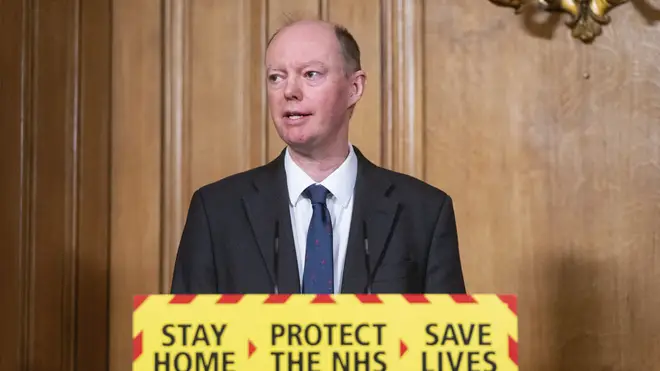
Rachel Johnson 7pm - 10pm
22 January 2021, 20:22

Professor Chris Whitty has defended the decision to delay offering a second vaccine jab, arguing it allowed for more people to be offered a level of immunity against Covid-19.
England's chief medical officer said it was still the plan to offer people two doses of the vaccine because the follow-up injection is understood to boost the length of time that someone is protected for against the virus.
But the Government adviser argued that double the number of people would receive the "great majority" of inoculation available against the deadly disease faster by following the strategy of extending the gap between doses from three weeks to 12.
It comes after the UK recorded a further 1,401 Covid-related deaths as of Friday, bringing the country's death toll to 95,981.
He made the comments after being challenged by a concerned member of the public at a Downing Street press conference about the decision to delay the follow-up jab.
Read more: Another 1,401 deaths from Covid-19 reported in the UK
Exclusive: Sadiq Khan calls for airport quarantine hotels for UK arrivals

Current evidence shows vaccines are effect against new variant
Prof Whitty said: "We are absolutely clear that everybody needs two vaccinations.
"The first gives the great majority, as far as we can see, of the initial protection, but the second vaccine increases that, and probably makes it longer lasting as well."
He continued: "So, we are very much committed to two vaccinations.
"The reason for extending the course of the vaccination is primarily to double the number of people that can get vaccinated, and so it is a public health decision.
"By a process of relatively simple maths, you can think that if a vaccine is more than 50% effective, if you double the number of people who are vaccinated over this very risky period when there is a lot of virus circulating, you are overall going to get some substantial benefit."
Read more: Police break up 400-person wedding at north London school
Read more: British tourists unlikely to be allowed into Spain 'until end of summer'
Prof Whitty, pressed on whether the delay could give the virus time to mutate and work against the protection afforded by the first jab, added the decision to delay the second vaccine doses was based on "a balance of risk".
"I think most people would agree that the risk that was identified was a relatively much smaller risk than the risk of not having people vaccinated, which essentially was the alternative," he added.

Patrick Vallance outlines evidence showing new variant is more deadly
Meanwhile, UK chief scientific adviser Sir Patrick Vallance downplayed concerns raised in Israel that a single dose of the Pfizer vaccine may not be as effective as previously thought.
Research emerging from Israel, a world leader in terms of the speed of its vaccine rollout, claimed that efficacy from the first dose of the Pfizer vaccine may be as low as 33%.
Studies have previously put the rate of protection much higher, reaching levels of 89% efficacy between 10 and 21 days after vaccination.
Sir Patrick told the press briefing on Friday that the Israeli findings remained "preliminary information" and that those behind the research - one of the four organisations that arranges health in the Middle East country - "haven't followed people for long enough".
"I think the Israeli health ministry has said they're not entirely sure those are the final data and they're expecting the effects to increase, so I think it's very preliminary," he said.
"We had a discussion with the Israeli advisers yesterday and they are expecting to get more information over the next few weeks."

New variant of Covid may be more deadly than original virus
At the same press conference, Boris Johnson announced there is "some evidence" the new UK Covid variant is more deadly than the original virus.
The prime minister said in addition to spreading more quickly, there is some evidence the new strain of coronavirus first identified in South East England "may be associated with a higher degree of mortality".
The prime minister told the press conference: "I must tell you this afternoon that we've been informed today that, in addition to spreading more quickly, it also now appears that there is some evidence that the new variant, the variant that was first identified in London and the South East, may be associated with a higher degree of mortality."
Clarifying Mr Johnson's comments, Sir Patrick said there is very early, "uncertain" evidence that is "not yet strong" that the UK variant is slightly more deadly than the older strain.
But he explained that if you took a sample of 1,000 men in their 60s with the original virus, roughly 10 would be likely to die. Whereas with the new strain, the death toll would be between 13 and 14.
The CSA also warned the variants which had emerged in South Africa and Brazil may be less susceptible to the vaccines that have been developed.
"We know less about how much more transmissible they are. We are more concerned that they have certain features that they might be less susceptible to vaccines," he said.
"They are definitely of more concern than the one in the UK at the moment and we need to keep looking at it and studying it very carefully."